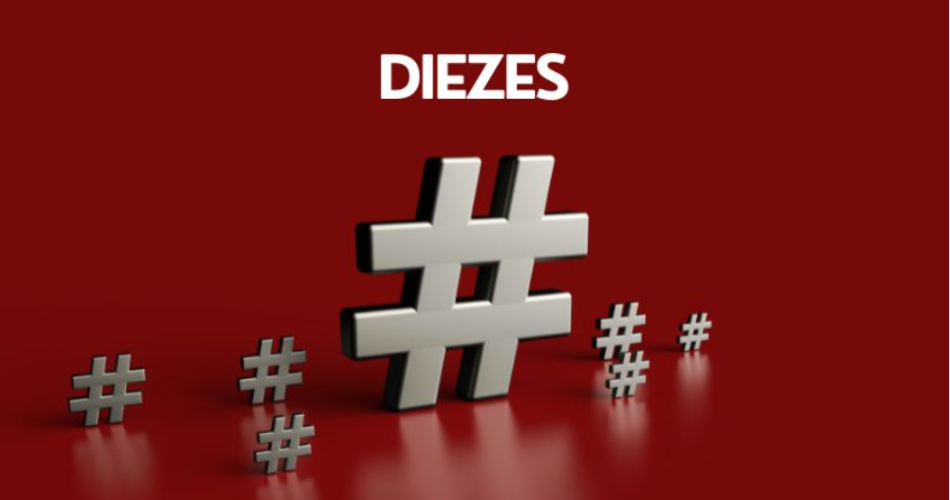Introduction
Hashtags, often symbolized by the hash sign (#), have undergone a fascinating evolution since their earliest use. Originally introduced in music notation in the 14th century, these symbols have transformed significantly over time. Today, hashtags are integral to digital communication, serving as potent tools that convey complex ideas and emotions in ways that words alone often cannot.
In the realm of digital interaction, hashtags have emerged as more than mere symbols. They are now essential in shaping online discourse, guiding cultural trends, and enhancing user engagement. This article delves into the intriguing history of hashtags, tracing their origins, development, and their profound influence across various sectors.
The Origin and Evolution of Diezes
The symbol commonly known today as the hashtag, or “dieze,” boasts a rich history that extends back to the 14th century. Originally, the dieze served a specialized role in music notation, indicating sharp notes within compositions. However, its significance took a dramatic turn in the late 2000s, transforming into a cornerstone of modern digital communication.
The hashtag’s contemporary function began in 2007 when Chris Messina, a forward-thinking product designer and social media expert, suggested using the dieze symbol on Twitter to aggregate discussions on specific topics. This innovative idea rapidly gained popularity, providing users with a powerful tool to categorize and locate content that aligned with their interests. Thus, the dieze evolved into the hashtag, becoming indispensable for organizing and connecting conversations across social media platforms.
As the influence of social media platforms expanded, so too did the role of hashtags. What began as a method for basic categorization soon evolved into a dynamic means for individuals and brands to foster engagement and interact with their audiences in more impactful ways. This evolution marked a pivotal change in digital communication, with hashtags emerging as cultural indicators that mirror societal trends and values.
The Use of Diezes in Social Media
In today’s digital landscape, hashtags have transformed the way people engage with online content. Initially a simple symbol, hashtags have evolved into a powerful mechanism for content discovery and community building. By categorizing posts, hashtags make it easier for users to explore and join conversations about specific topics.
When users click on a hashtag, they enter a space dedicated to shared interests and communities. For example, a hashtag like #TravelGoals brings together travel enthusiasts, while #FitnessJourney connects those dedicated to health and wellness. These hashtags foster a sense of community and help users engage with content that aligns with their personal interests.
Brands have swiftly recognized the advantages of using hashtags. By strategically incorporating these symbols, companies can enhance their visibility and tap into popular conversations. A well-placed hashtag can significantly boost a product or campaign’s reach, often achieving viral status more effectively than traditional marketing methods.
Additionally, hashtags encourage the creation of user-generated content by inspiring participation in various trends and challenges. This organic trend formation enriches the digital environment, allowing diverse voices to contribute and shape the narrative.
As social media continues to evolve, hashtags play a crucial role in influencing interactions and shaping online culture. Understanding their impact is essential for navigating the complexities of modern digital communication.
Diezes as Cultural and Social Commentary
Hashtags, once simple tools for categorizing social media content, have evolved into significant cultural and social symbols. They now serve as reflections of societal values, trends, and movements, offering a snapshot of contemporary issues and events.
A single hashtag can become a catalyst for dialogue on pressing social matters. For instance, hashtags like #BlackLivesMatter and #MeToo have transcended their origins to become influential forces in raising awareness and galvanizing collective action for social justice. These tags distill complex issues into concise, memorable symbols that foster broad engagement and solidarity.
Both artists and activists leverage hashtags to convey their perspectives and address multifaceted topics. By simplifying intricate issues into more accessible formats, hashtags invite public participation in discussions that might otherwise be difficult to engage with. Their viral nature can amplify local concerns into global conversations, giving a platform to voices that might otherwise go unheard.
Furthermore, hashtags reflect personal identity and communal support. Each tag contributes to an evolving dialogue, enhancing the conversation with each new trending topic or viral event. As hashtags continue to develop, they are poised to play an even more prominent role in shaping cultural narratives and societal discussions.
Hashtag Activism: Using Diezes for Social Change
Hashtag activism has emerged as a transformative force in social movements, revolutionizing how causes gain visibility and mobilize supporters. By utilizing platforms like Twitter and Instagram, hashtags enable individuals to amplify their voices and connect with others who are passionate about similar issues.
Campaigns such as #BlackLivesMatter and #MeToo exemplify the significant role hashtags play in driving social change. These concise phrases distill complex social issues into memorable calls to action, fostering widespread engagement and raising awareness. Through these hashtags, online communities come together to share personal experiences, resources, and expressions of solidarity, thereby strengthening grassroots efforts to address systemic injustices.
However, hashtag activism is not without its criticisms. Some argue that it can lead to superficial support rather than meaningful action. When individuals engage with a hashtag but do not follow through with real-world involvement, the potential impact of the movement may be weakened. Additionally, there are concerns that some groups or individuals might use hashtags for self-promotion or commercial gain, which can detract from the authenticity of the cause.
Despite these challenges, hashtags remain vital tools for initiating conversations about critical social issues. Their influence extends beyond digital spaces, inspiring discussions and prompting collective action across various areas of society.
The Impact of Diezes
In the evolving world of digital marketing, hashtags have emerged as a transformative tool, revolutionizing how brands engage with their audiences. These digital markers have become pivotal in enhancing visibility and fostering deeper connections within the digital landscape.
Hashtags offer brands a strategic method for categorizing content, making it more accessible to users interested in specific themes or topics. For instance, a company promoting eco-friendly products can leverage hashtags such as #SustainableLiving or #EcoFriendly to attract and engage individuals passionate about environmental sustainability. This targeted approach not only boosts engagement but also encourages meaningful interactions with a brand’s content.
Moreover, hashtags play a crucial role in shaping a brand’s identity and voice. By creating a sense of community around shared interests or values, brands can cultivate stronger emotional bonds with their audience. Notable campaigns, like Coca-Cola’s #ShareACoke, illustrate the power of hashtags in not only driving sales but also in crafting memorable customer experiences.
As digital marketing continues to evolve, understanding and effectively utilizing hashtags will be essential for brands seeking to maintain a competitive edge. Those who adeptly incorporate hashtags into their strategies will be well-positioned to thrive in the ever-competitive digital marketplace.
Controversies Surrounding Diezes
Despite their widespread adoption, hashtags have been the subject of significant debate and concern. One major issue is their potential to overshadow substantive conversations online. When trending hashtags dominate the discourse, they can detract from more meaningful discussions, reducing the overall quality of online conversations.
Another controversy revolves around the use of hashtags by brands to capitalize on social movements. This practice can appear exploitative, as brands may use sensitive topics as marketing tools. What might start as a genuine gesture of solidarity can quickly be perceived as a mere promotional strategy, diluting the original intent behind the hashtag.
The proliferation of fake news and misinformation has further complicated the role of hashtags. Misleading or deceptive hashtags can facilitate the rapid spread of false information, which can have real-world repercussions. This situation underscores the importance of critical thinking and vigilance when engaging with online content, as well as awareness of the potential for manipulation.
Censorship debates also emerge as platforms attempt to manage harmful content linked to certain hashtags. Striking a balance between protecting individuals and preserving free speech remains a complex and ongoing challenge.
These controversies highlight the complex and evolving nature of hashtags and their impact on digital dialogue. Addressing these issues is essential for preserving the integrity of online interactions and ensuring that digital discourse remains meaningful and authentic.
Conclusion: The Future of Diezes in the Digital Age
The future of diezes looks bright as they adapt and evolve within the ever-changing digital landscape. With continuous advancements in technology and the ongoing innovation in social media, diezes are poised to assume new, multifaceted roles that extend beyond their traditional uses.
The integration of artificial intelligence is set to revolutionize how diezes are utilized, particularly through smarter hashtag recommendations that align with individual preferences. This development promises to enhance user engagement and improve content discovery, making interactions more personalized and effective.
Moreover, diezes are increasingly being harnessed for activism, with movements utilizing their influence to drive meaningful action and achieve concrete outcomes. This shift highlights the growing power of diezes in mobilizing communities and advancing social causes.
In response to these trends, marketers are adapting by creating campaigns that forge emotional connections with audiences through relevant diezes. As brands become more attuned to the sentiments of their consumers, we can expect to see a deeper integration of marketing strategies with societal issues, reflecting a more empathetic approach to engagement.
Despite ongoing controversies surrounding diezes, their role in digital communication remains significant. From their origins as musical symbols to their current status as cultural icons, diezes have profoundly impacted how we interact, express ourselves, and effect social change. Looking ahead, diezes will continue to play a crucial role in shaping both the digital landscape and our interactions within it.
Keep up-to-date with breaking news and updates on Newslinktimes
